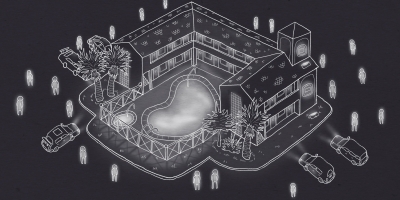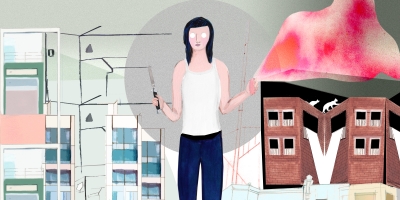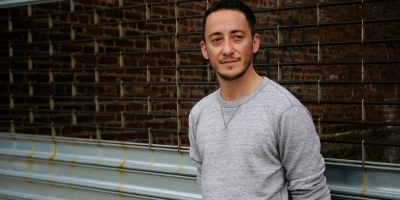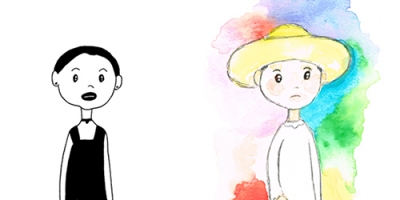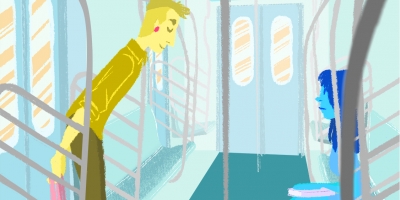Nonfiction
I Have No Bow
by Amy K. Bell

Dear Sir,
You were a tall man, with bright red hair neatly trimmed and two pink plugs nestled like lotus eyes in your earlobes. You appeared unusual, but perhaps not that unusual given the neighborhood we were passing through. This was on the train, under the city. You stepped into the car carrying grocery bags in either hand. You were accompanied by a less remarkable friend. I was seated. I’d finished my book and had no music—a vulnerable, ravenous state—and so I was looking around, at people, at their patches. My eyes lingered on you, taking you in.
Clearly you felt this. You turned to me and, without hesitation, widened your light eyes at me, just for a second. I was caught. That was when you pursed your lips, curtly, and bowed.
It was almost polite, like an Edwardian man acknowledging a passing lady just below his station. It was almost genuine. It seemed to say, Let us remember we are all conscious, all aware. Did you think I wouldn’t notice? I shall take us into the realm of civilized interaction, your little bow said, for unlike you, I always have my wits about me.
It could also have said, Take a picture, it’ll last longer.
A wave of hot embarrassment coursed through me, and I turned away. I pretended I had better things to do. I took out my phone and pretended to do those things on it. I took a second glance at you, but you were laughing with your friend. You were preparing to go about your day, to make your dinner with those groceries, jiggle your pink plugs in the mirror, and bear witness to your distinct materiality.
I stared at the dirty floor past my phone, a kid who didn’t know enough to be slick in public. I didn’t feel I could sit back up and reanimate until you got off the car.
Has this ever happened to you, sir? These little self-imposed shames? Well. As I shook off my helplessness, I started to get miffed. See, I’m not totally ignorant. I know something about staring, about the feeling of a gaze, how to read its intentions.
I am a woman, after all. Our bodies’ very fact of being invites scrutiny, whether we’re fat or slender, tall or short, rich or poor, alert or distracted. You may be tired of women railing on about harassment on the public street—I wouldn’t blame you—but since you responded to a stare, since you went out of your way to acknowledge that I was affecting you, let’s talk about it.
I’ll start. Since growing into my body, I have learned to ignore catcalls (those wanton, bizarre expressions), ignore those hard-to-locate kissy sounds, ignore conversation that is about me but conducted without me, ignore strangers who think I should Smile! and tell me so, ignore the male body rubbing against mine on the crowded subway, ignore hands thrust out for me to shake. I know it is indecent to turn away from a person’s outstretched hand. In the name of safety, please excuse me.
I shook back once, with a ragged man on a subway platform. I was nineteen. His hair was a mess, but he had friendly eyes. His hand was large and filthy. He held it out and said, “You’re the most beautiful thing I’ve seen all day” and so what, I shook the warm thing, he’d charmed me. Then my friend Britt yelled, “Amyy! Come on, Amy!” and I pulled my hand back immediately, as if he’d grabbed me.
All of these half-understood, half-acknowledged interactions generated without my participation. You were most provocative. How is it that I, with my experience interpreting and avoiding public interaction, got completely schooled by you? How had I never thought of using your simple, universal gesture? I’ve questioned my choice to ignore interested strangers before, but had never been witness to, much less experienced firsthand, a viable alternative to pretending not to notice. I liked what you did and how you did it. You chose to act, and it sent the shame through me; you called me out, but civilly. You were saying Hello while also saying We are done here.
Graceful, elegant—bravo!
So do what I did, you’re thinking. I hear your dulcet self-assuredness and wonder.
But what is my sex’s equivalent to the bow? The curtsy.
Let us not speak of it at length. With little societal relevance beyond Renaissance Faires and the imaginations of little girls, it’s hardly an effective greeting for a modern woman. Far too cute, first of all. There’s nothing commanding about a curtsy. I think it died with the formal title of “maid.” Even if it could somehow escape the cultural weight of its origins, don’t forget that the curtsy calls attention to the legs and makes the breasts jiggle if performed too stiffly.
No, the bow is certainly the better of the two. It’s humble, for sure, but it maintains a capacity for haughtiness, which we see in chivalry. It can serve as a kind of gracious overture or all-too-knowing closure. You used it as the latter, a resounding period to the dependent clause of my stare. The bow’s suggestion of servitude is malleable, depending on the situation, depending on the man. Deep bows, slight bows. It’s a highly flexible communication, in this way.
But sir, happy as I am to know firsthand the efficacy of your gesture, something about doing it myself sticks in my craw. I bear the legacy of the gaze, not you. My body sells cars and speaks volumes just by being and has anti-rape locking underwear and roofie-detecting nail polish invented for it. That’s my besieged kingdom. The subway car is a woman’s battlefield. Somehow, there you were among us, discharging your impressive weapon with ammunition to spare.
Now, a secret: I gave into pride and took a page from your playbook. At the next opportunity, I was resolved to bow.
But when I passed those two men holding the handlebars of their bikes, braying at me, “There’s a good girl, look, there she goes,” and it was just us on the sidewalk, my body wouldn’t do it. It’s not going to work, my butt was telling me, it’s just going to open us up for more scrutiny. It’s going to come off funny. They’ll tease you worse. Maybe try sweatpants instead.
I admit to some cowardice in the experiment.
I kept walking, not daring to look at them, much less turn to face them, much less bow before them. Everything seemed wrong. A bow would have none of the self-possession, none of the condescension, none of the knowingness. It could never be read that way, could never be performed as you performed it, because I have no bow!
Their voices went on mumbling about what a good girl I was until I was out of their earshot, or they were out of mine—I’m not sure anymore who is fixed and who is in motion in those situations. It was yet another unsure moment implicating some part of my existence while ignoring the fullness of it.
Well, do you have any alternatives to offer? What action do I take? Yours was a brilliant move, and memorable, but part of me still fears it is unworkable for the general public, and that I shall have to come up with something better.
Sincerely,
Amy
